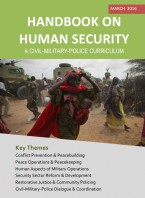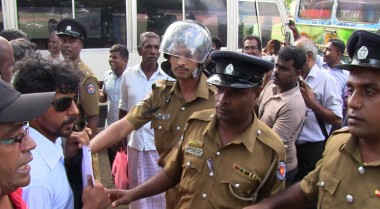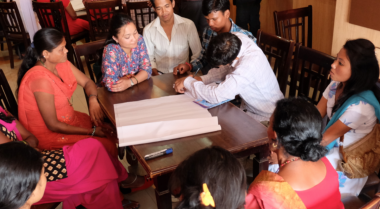
Handbook on Human Security: A Civil-Military-Police Curriculum
No one group can achieve human security on their own without working with others. Civil society, military and police all have roles to play in achieving human security. Human security depends on fruitful civil-military-police understanding and coordination. New generations of security sector leaders recognise that civil society is an important stakeholder for sustainable security. At the same time, many in civil society recognise the need to engage with the security sector as key stakeholders necessary for sustainable peace. Human security requires local ownership and active engagement between the security sector and civil society. Integrated training for the security sector and civil society can help identify common ground and also understand the areas where their approaches are different. This curriculum offers an innovative, first of its kind integrated civil-military-police curriculum. This manual has been developed together with Alliance for Peacebuilding and the Kroc Institute for International Peace Studies, and was funded by the Ministry of Foreign Affairs of the Netherlands and the Rockefeller Brothers Fund.
Full publication is below. Or download the handbook per module:
Module 1: Leadership in Complex Environments
This module provides an introduction to the most important foundational ideas in this Handbook. It creates a foundation for understanding why it is important for civil society, civilians in government, military and police to coordinate their approaches to human security.
Module 2: State-Society Relations
This module introduces the definitions of the state-society relationship, the security sector, civil society.
Module 3: Multi-Stakeholder Coordination
This module provides a conceptual foundation for analysis of the roles and responsibilities of each of these stakeholders. It identifies a range of approaches to civil-military-police coordination. It explores how coordination relates to local ownership and the use of multi-stakeholder processes. Both technical and conceptual, the module aims to identify different types of coordination forums to increase local ownership in security.
Module 4: Coordination on Conflict Assessment
This module provides security forces, security policymakers and civil society with shared tools for researching and carrying out a conflict assessment and designing a basic intervention plan. Without a shared understanding of the particular challenges of a given conflict, there can be no comprehensive strategy or coordination to support human security.
Module 5: Comparing Approaches to Security
This module compares and contrasts different approaches to security. There are fundamental tensions between different approaches to security. Understanding different points of view is essential to enable all stakeholders to appreciate the different theories of change that underlie the strategic narrative in each approach.
Module 6: Conflict Prevention and Peacebuilding Skills
Multi-stakeholder coordination requires advanced communication and conflict skills. These skills are necessary for every level of interaction - but become even more important in a complex environment. This module provides civil society, military and police leaders with practical skills in communication, dialogue, negotiation and mediation.
Module 7: Civilian Assistance
This module helps civilians, military and police to understand different terminology, potential dangers and international guidance for coordinating civilian assistance.
Module 8: Protection of Civilians
This module provides a foundation for military, police, and civilians on the core ideas, functions, practices, and principles known as "protection of civilians" (PoC). This module aims to provide a common understanding in each of three areas: general protection of civilians, gender mainstreaming in security, and mitigating civilian harm.
Module 9: Trauma Awareness, Resilience & Managing Stress
This module provides an introduction to the impact of trauma, stress, resilience and self-care that face military, police, civilians who work in stressful contexts.
Module 10: Security Governance, Accountability & Performance
This module concludes the handbook with a lesson outlining how civilians, military and the police can work together to monitor and evaluate security governance, accountability and performance.



